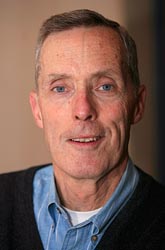It was a brief scene in a movie where the husband and wife were having a conversation. He was in the foreground; she was in the background, brushing her hair as they talked.
“I hope you will always look that way,” he said admiringly.
“I won’t,” she said, her correction politely spoken with a slight smile.
There is a billion-dollar industry trying to prove her wrong. Those who wish to be forever young will push the U.S. market for anti-aging products from about $80 billion today to more than $114 billion by 2015, according to the market research firm Global Industry Analysts. These youth-seekers are expected to spend billions on wrinkle creams, plastic surgery, supplements, hormone replacement therapy, workout regimes, and other remedies and procedures.
Television commercials feature products for sanding, painting and glossing the skin much like the home improvement programs show products for sanding, stripping and waxing to restore old furniture. In the advertisers’ world, no one would have gray hair.
Portraying aging as bad, as something not natural seems to be peculiar to Anglo-Saxons. Native Americans, Asians and other cultures respect, if not revere, elders believing that they have, among many attributes, wisdom to offer the next generation.
Aging is inevitable, consistent with the Christian concept of death. We are, after all, members of the pilgrim church on earth, a temporary condition. Pilgrims didn’t look all that good as their journey ended, whether arriving on the Mayflower or on wagon trains at the end of the Oregon Trail. Aging is part of the pilgrimage. Trying to look good when the journey can be tiring and wearing is an act of self-deception.
Perhaps the distaste for aging has to do with a fear of the inevitability of death. As the comedian Woody Allen once said, “I’m not afraid of death; I just don’t want to be there when it happens.” Aging is a process to be accepted, not denied. It is part of the wear and tear undergone on the journey to that ultimate destination we seek.
This Christian understanding of the role of death in life is something to reflect on during All Saints’ Day and All Souls’ Day.
***
Kent, now retired, was editor of archdiocesan newspapers in Omaha and Seattle. He can be contacted at: Considersk@gmail.com.
PREVIOUS: A dream built on 25 cents a day and resilience
NEXT: These are the facts about the HHS mandate




Share this story